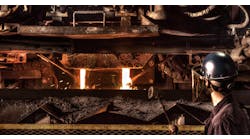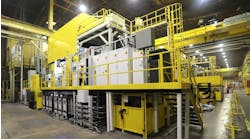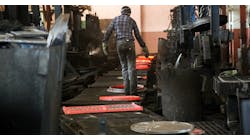According to a recent report, the American Foundry Society and the Foundry Association of Michigan have formally urged Michigan’s Gov. Gretchen Whitmer to end extended unemployment benefits, implemented to support individuals whose income was reduced by closures imposed to minimize social activity during the Covid-19 pandemic of 2020. The pandemic did not create manufacturers’ problem with skilled labor but reversing the emergency provisions and getting “back to normal” is more complicated than expected.
In their letter to Whitmer, cited by the report, AFS and FAM offered the statistic that the metalcasting industry accounts for 490,000 positions in the total U.S. workforce, representing $32.1 billion in wages and benefits, but they emphasized that the unavailability of workers is the most serious problem facing foundries today. Not foreign trade or environmental regulations, nor energy costs or any of the various quality and performance concerns that occupy the minds of metalcasting owners and operators. More than one-third of FM&T readers surveyed at the end of 2020 came to that same conclusion.
“We therefore urge you to join at least 12 other states in ending participation in extended unemployment insurance programs enacted this year,” AFS and FAM wrote to the governor, according to portions of their communication cited in the report. “Supplemental assistance adopted during the height of the pandemic in 2020, when there were no vaccines available, was meant to be short-term and temporary. Today, we hear on a daily basis from metalcasters who indicate that these expanded benefits are a key disincentive to work and are keeping able-bodied Americans on the sidelines.”
It’s possible the foundry groups are exaggerating the significance of the link between their labor shortage and Michigan’s generosity to idle workers. It is simplistic to conclude that workers are simply concerned for their health, or that adjusting the financial incentives will cause them to reconsider their risks. The difficulty of locating and retaining skilled workers is a longstanding problem for manufacturers, one that market-based approaches have not resolved. AFS and FAM contend that some Michigan metalcasters are “offering higher wages, signing bonuses, and tuition reimbursement” as incentives to draw workers to fill their open positions. And still, they have openings to fill.
There are three parts to this problem -- the employers, the would-be employees, and the government. The metalcasters’ perspective is easy to understand, and they are correct to press for an end to the benefits – which functionally increase the cost of employing workers and keeping a business performing effectively.
The relationship between governments and businesses is sometimes adversarial, as with regulatory bodies for occupational safety, environmental standards, and energy rates. But just as common are the state-level commissions that incentivize business investments, grant tax incentives for job creation, build roads and extend utility lines to serve new development, and underwrite construction bonds that will speed business expansions.
Governments should want strong businesses because employed citizens pay income, consumption, and even property taxes – which support the cost of maintaining a civil society and make it possible to plan for all manner of good things. These are primary assumptions of a market-based democracy, and why state officials would not want employers bringing in new workers calls for an explanation.
The third part of the problem – the unmotivated people who are not taking the opportunity of employment – is even more troubling. Recognizing how long manufacturers have struggled to fill openings for skilled workers, we have to consider that our basic assumptions about employment no longer apply.
Regular work makes individuals smarter and more responsible because it focuses their energy and attention on practical results and imbues them with a better understanding of their own worth. It helps shape good citizens. Employers who want to grow a business – and not simply an investment – rely on employees to fulfill their vision, attend to details with appropriate concern for the outcome, carry out the enterprise goals when overlooked or unexpected developments occur, and to provide additional perspectives on the projects at hand, perspectives that enhance the potential of the enterprise.
If finding skilled workers is a problem, it may be that employers, workers, or state officials have changed their expectations of the arrangement that supports a civil society. Whether it is so or not, we have some work to do to fix it.









